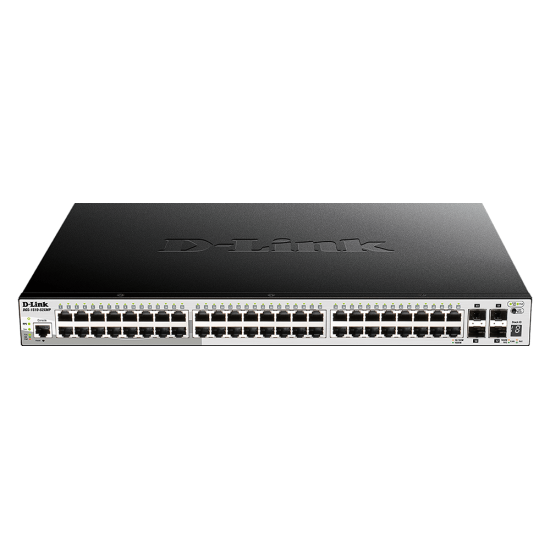
| IN STOCK |
|
Ships in 6 days Shipping to United Kingdom only £ 6.99! |
The D-Link DGS-1510 Series is the latest generation of Smart Managed switches with 10G capability, available with 16, 24, or 48 10/100/1000 Mbps ports plus additional fibre ports for physical stacking or uplinks. The PoE-capable DGS-1510-28P, DGS-1510-28XMP, and DGS-1510-52XMP switches provide additional flexibility for businesses looking to power IP phones, wireless access points, or IP cameras using existing network infrastructure. The combination of high bandwidth connections and PoE support make the DGS-1510 Series ideal for Small-Medium Enterprise (SME) and Small-Medium Business (SMB) environments.
10G SFP+ Stacking/Uplink Ports
The last two SFP+ ports of the DGS-1510 Series switches allow users to create a physical stack of up to 6 units in a fault-tolerant ring or linear topology using Direct Attach Cables (DACs) or any compatible SFP+ transceiver1. This creates a total of 288 Gigabit ports, ensuring high bandwidth while staying cost-efficient. Meanwhile, the remaining uplink ports can be used for other functions, such as connecting to a larger network. Users can also easily configure and manage any of the DGS-1510 Series Smart Managed switches in a single stack. With 20 Gbps full-duplex capabilities, the DGS-1510 Series offers 10G connectivity to core networks and servers while still maintaining fast data transfer rates.
Layer 3 Traffic Management
The DGS-1510 Series provides static routing, allowing you to segment your network into workgroups that communicate between VLANs and increase application performance. With these capabilities, you can reduce the load on your core devices, allowing you to create a scalable and efficient network.
Extensive Layer 2 Features
The DGS-1510 Series switches are equipped with a complete line-up of Layer 2 features, including IGMP Snooping, Port Mirroring, Spanning Tree, and Link Layer Discovery Protocol (LLDP). The IEEE 802.3x Flow Control function allows servers to directly connect to the switch for fast, reliable data transfer. Network maintenance features include Loopback Detection and Cable Diagnostics. Loopback Detection automatically detects and shuts down loops created by a specific port or VLAN. The Cable Diagnostics feature, designed primarily for administrators and customer service representatives, can determine cable quality and can quickly discover sections of cabling that need to be replaced.
Traffic Classification & QoS
The DGS-1510 Series supports Auto Surveillance VLAN (ASV) and Auto Voice VLAN, which are best suited for VoIP and video surveillance deployments. Auto Surveillance VLAN is a new, industry-leading technology built into D-Link Smart switches. This technology consolidates data and surveillance video transmissions through a single DGS-1510 Series Smart Managed switch, saving businesses the costs of maintaining expensive dedicated hardware and infrastructure. ASV also ensures the quality of real-time video for monitoring and control without compromising the transmission of conventional network data by giving ASV traffic priority over other packets.
Keep Your Network Secure
D-Link’s innovative Safeguard Engine protects the DGS-1510 Series against traffic flooding caused by malicious attacks. The DGS-1510 Series supports both MAC and web-based access control. This gives network administrators multiple authentication options, reducing deployment times and removing the need for client software. The DGS-1510 Series supports IEEE 802.1X port-based authentication, allowing network users to be authenticated through external RADIUS servers. The Address Resolution Protocol (ARP) Spoofing Prevention feature helps to prevent attacks that may allow an intruder to intercept users’ traffic while the DHCP Server Screening feature screens rogue DHCP server packets from user ports to prevent unauthorized IP assignment.
IPv6 Ready
The DGS-1510 Series is IPv6 ready and supports various IPv6 functions such as MLD Snooping, IPv6 security features, and IPv6 Quality of Service (QoS), ensuring seamless integration with next-generation networks. The DGS-1510 Series also supports IPv4/v6 dual stack functionality, which allows the switches to act as a bridge between IPv4 and IPv6 networks.
1 When stacking in a linear typology, the remaining unused SFP+ ports in the stacking port pair of the top and bottom switches will also be considered occupied by the switch and cannot be used for any other purpose.
| NUMBER OF PORTS | 48 x RJ45 ports 4 x 10G SFP+ ports |
| PRIMARY PORT SPEED | Gigabit Ethernet (10/100/1000) |
| NETWORKING STANDARDS | IEEE 802.1p,IEEE 802.3,IEEE 802.3ab,IEEE 802.3u,IEEE 802.3x |
| SWITCH LAYER | L3 |
| MAC ADDRESS TABLE | 16000 entries |
| SWITCHING CAPACITY | 128 Gbit/s |
| THROUGHPUT | 95.24 Mpps |
| OPERATING TEMPERATURE | -5 - 50 °C |
| INPUT VOLTAGE / FREQUENCY | AC input voltage: 100 - 240 V AC input frequency: 50 - 60 Hz |
| DIMENSIONS | Width: 440 mm Depth: 308 mm Height: 44 mm |